Balaam
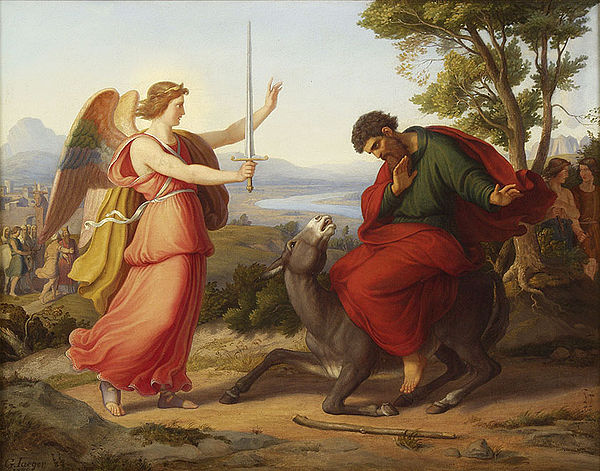
Balaam and the angel, painting from Gustav Jaeger, 1836.
Balaam (beɪlæm/; Hebrew: בִּלְעָם, Standard Bīlʻam Tiberian Bīlʻām)
is a diviner in the Torah (Pentateuch) whose story begins in Chapter 22 of the Book of Numbers.

Balaam and the angel, painting from Gustav Jaeger, 1836.
Balaam (beɪlæm/; Hebrew: בִּלְעָם, Standard Bīlʻam Tiberian Bīlʻām)
is a diviner in the Torah (Pentateuch) whose story begins in Chapter 22 of the Book of Numbers.
![]()
![]()
Have you ever heard of Balaam the son of Beor? Have you ever studied his story? Probably not, He is one of those little-known characters tucked away in the Old Testament, and yet he is an extremely interesting one. The story of his life is found in the book of Numbers. With that as background, let's go to the 22nd chapter of Numbers and begin reading with verse 1:
Then the sons of Israel journeyed and camped in the plains of Moab beyond the Jordan opposite Jericho. Now Balak the son of Zippor saw all that Israel had done to the Amorites. So Moab was in great fear because of the people, for they were numerous; and Moab was in dread of the sons of Israel. And Moab said to the elders of Midian, "Now this horde will lick up all that is around us, as the ox licks up the grass of the field. "And Balak the son of Zippor was king of Moab at that time. So he sent messengers to Balaam the son of Beor, at Pethor, which is near the River, in the land of the sons of his people, to call him, saying, "Behold, a people came out of Egypt; behold, they cover the surface of the land, and they are living opposite me. Now, therefore, please come, curse this people for me since they are too mighty for me; perhaps I may be able to defeat them and drive them out of the land. For I know that he whom you bless is blessed, and he whom you curse is cursed."
We need a bit of background to this passage. As you may know, forty years prior to this event the nation of Israel had come out of the land of Egypt, had traveled down to the southern part of the Sinai Peninsula, and there at Mount Sinai had received the Law, the commandments which dealt with moral and religious and civil life. They had constructed a tabernacle, appointed a priesthood, and begun to institute the sacrifices. Then after spending about ten and a half months at Mount Sinai they had begun to travel north through the peninsula until they reached Kadesh-barnea at the end of the second year from their exodus.
At Kadesh the unbelief of the people, which had been under the surface all this time, made itself known, and the people refused to go into the land. So God turned them back, and for 38 years that generation wandered aimlessly in the wilderness and all the men 20 years and older who were a part of that generation died. I calculated once that, given 600,000 men dying over a thirty-eight-year period, they must have held something like 50 funerals a day. This was a horrible time, a very dismal time in the life of Israel, while they were being judged for their failure to go into the land. They abandoned the sacrifices, they no longer circumcised their children, the priesthood was abandoned, and they broke up into little bands roving all over the wilderness.
But after 38 years the new generation gathered again at Kadesh and began to make plans to go into the land. They left Kadesh and traveled in a northeasterly direction. They attempted to go through the country of Edom but the Edomites turned them back, and so they had to make a great loop to the east around the borders of the Moabites. Finally they arrived on the plains of Moab, just across the Jordan River from the city of Jericho. There they engaged in battle with some of the kings who lived in that area - the Amorite king, Sihon, and Og the king of Bashan - and defeated them. Og is referred to in Scripture as one of the Rephaim, one of the giants whose size is given in terms of the dimensions of his bed - 6 feet by 9 feet. These were very imposing enemies, but Israel was victorious.
Now, when Israel had traveled around the borders of Moab, the Moabites had given them food and water and had provided for their needs because they were intimidated by the Israelites. They thought that when the Israelites reached the plains of Moab the Amorites would defeat them. But they didn't. The nation of Israel defeated the Amorites. And so the Moabites panicked. They knew they had to do something. Balak, the king of Moab, formed an alliance with the king of Midian, and they sent emissaries off to Mesopotamia to hire a sorcerer to come and curse the nation of Israel for them. They knew they couldn't defeat them in battle, normally, but they felt that if they could hire this wizard to cast a spell over Israel they would then be able to defeat them.
Here we encounter this man Balaam, who is said to come from the land of the great River the Euphrates, from the city of Pethor. The Hebrew word "pethor" means "to interpret dreams."Evidently this was a community of wizards, or sorcerers, astrologers, people who were occultists, who worshiped demons. These were the magi who lived in Mesopotamia. Balaam apparently was a very powerful wizard - his name means "the devourer of people." He had a reputation for strength and power. His father's name, Beor, means "one who burns up," so Balaam may have come from a long line of powerful sorcerers. And Balak felt that if he could bring Balaam down to cast a spell over the nation of Israel, given the kind of power that this man had, then Israel would be impotent.
It is interesting, as we look at the account, that though Balaam was a sorcerer, a wizard, he also knew about the God of Israel. He refers to him by his covenant name, Jehovah. He was a man who had an immense amount of truth about the true God. He came from the same area as did Abraham, and perhaps there was a great deal of truth about God available to men there at this time. And yet he drew from occult sources, from demonic sources, as well.
In verses 7 through 14 we have the account of the emissaries who were sent from Balak to Balaam:
So the elders of Moab and the elders of Midian departed with the fees for divination in their hand; and they came to Balaam and repeated Balak's words to him. And he said to them, "Spend the night here, and I will bring back word to you as the Lord [Jehovah, the covenant name of God] may speak to me." And the leaders of Moab stayed with Balaam. Then God came to Balaam and said, "Who are these men with you?" And Balaam said to God, "Balak the son of Zippor, king of Moab, has sent word to me, 'Behold, there is a people who came out of Egypt and they cover the surface of the land; now come, curse them for me; perhaps I may be able to fight against them, and drive them out.' "And God said to Balaam, "Do not go with them; you shall not curse the people; for they are blessed." So Balaam arose in the morning and said to Balak's leaders, "Go back to your land, for the Lord has refused to let me go with you." And the leaders of Moab arose and went to Balak, and said, "Balaam refused to come with us."
Hurray for Balaam! He would not transgress the Lord's word. There are at least two ways in Hebrew to negate an idea, and God, in his revelation to Balaam, uses the strongest possible terms, the same terms which are used in the Ten Commandments: "Thou shalt not go. Thou shalt not curse." Balaam knew exactly what God wanted. There was no question in his mind. God had clearly revealed his will to Balaam, just as God clearly reveals his will to us. We are never in doubt; God has given us his word. And Balaam knew that God's word was not in question, because later on, in one of his oracles, he says, "God is not a man, that he should lie, nor a son of man, that he should repent." That is, "God speaks the truth, He does not lie, and he does not change his mind." Balaam knew that.
The reason that God speaks the truth is that he knows what is profitable in this world, what will make life worthwhile . . . and what will destroy us. He knows. And he reveals the truth, not to cramp our style, but because he wants us to avoid the things which ultimately are destructive in life. Therefore he cannot change his mind. He loves people, and to change his mind would mean that we would be exposed to things which would destroy us. God knew that if Balaam cursed Israel, Balaam would suffer. God wasn't concerned about Balaam's curse that somehow it would frustrate God's efforts with Israel and would destroy them. No, that wasn't God's concern. God was concerned for Balaam, because back when God had given the Abrahamic Covenant he had told Abraham, "He who blesses you will be blessed, and he who curses you will be cursed." And that has been true down through history. God knew that if Balaam cursed Israel, Balaam would be cursed. And so, because God loved Balaam, he said, "No, you cannot go." And Balaam knew that was the truth, and he said, "I won't go." Hurray for Balaam! Verses 15 through 20:
Then Balak again sent leaders, more numerous and more distinguished than the former. [The Hebrew says that he sent "heavier" leaders!] And they came to Balaam and said to him, "Thus says Balak the son of Zippor, 'Let nothing, I beg you, hinder you from coming to me; for I will indeed honor you richly, and I will do whatever you say to me. Please come then, curse this people for me.' " And Balaam answered and said to the servants of Balak, "Though Balak were to give me his house full of silver and gold I could not do anything, either small or great, contrary to the command of the Lord my God. And now please, you also stay here tonight, and I will find out what else the Lord will speak to me. "And God came to Balaam at night and said to him, "If the men have come to call you, rise up and go with them; but only the word which I speak to you shall you do."
How strange of God! The God who does not change his mind, changes his mind. He says on one hand, "Balaam, don't go. You shall not go." And then later he says, "Balaam, go." Why? Well, the key to this whole issue is found, I believe, in Balaam's words to the emissaries, found in verse 18, when he says, "Though Balak were to give me his house full of silver and gold, I could not do anything." The thing which crossed my mind when I read that was, "Who said anything about silver and gold?" You see, the real heart of this man begins to surface. Balaam wanted silver and gold. The reason he had not gone before was not that he wanted to be obedient to God, but that there really was no conflict of wills. The price wasn't right before. They hadn't offered enough. But now there is a conflict of wills. His love for money is conflicting with his love for God, and he is determined to get what he wants.
Peter picks this up in his second epistle when he writes about men in the church who were false teachers, who Peter said, "...followed the way of Balaam, who loved the wages of unrighteousness...." That was Balaam's problem. He loved money more than he loved God. And so he says, "I'll go ask God again." Now, he already has God's word. It is clearly revealed. But Balaam, says, ''I'll ask him again. Maybe he'll change his mind."
But God is not that kind of God. He is not a softie. We sometimes think of God as stern on the outside but made of putty inside - and if we just wheedle and cajole, sooner or later we'll get our way. But God does not want us to have our way because he knows that ultimately it will destroy us. Yet he gives in to Balaam, not because he is a softie but because he will not control Balaam to the point that Balaam cannot act according to his own will if he insists upon it. He lets him go. And that is the way that God deals with us. If we insist upon going our own way, then God takes his hands off of us and he lets us go. There is a passage in Psalm 106 in which David says with reference to Israel, "He [God] gave them their request, but sent leanness into their soul." And this is what he does with Balaam. He says, "All right, Balaam, I know your heart. I know what you are after, and so I'll let you go." Notice what happens in verses 21 and 22:
So Balaam arose early in the morning, and saddled his donkey, and went with the leaders of Moab. But God was angry because he was going and the angel of the Lord took his stand in the way as his adversary against him.
You see, though the Lord will let us go, he still loves us and he wants to stop us. And he will do everything he can to reach us and to get us to turn around and go back to the place of obedience. He will put roadblocks in our way. And this is what he is doing with Balaam. As Balaam mounts his donkey and starts for the land of Moab the angel of the Lord appears before him as his adversary to stop him. Verses 22 through 27:
Now he was riding on his donkey and his two servants were with him. When the donkey saw the angel of the Lord standing in the way with his drawn sword in his hand, the donkey turned off from the way and went into the field; but Balaam struck the donkey to turn her back into the way. Then the angel of the Lord stood in a narrow path of the vineyards, with a wall on this side and a wall on that side. When the donkey saw the angel of the Lord, she pressed herself to the wall and pressed Balaam's foot against the wall, so he struck her again. And the angel of the Lord went further, and stood in a narrow place where there was no way to turn to the right hand or to the left. When the donkey saw the angel of the Lord, she lay down under Balaam; so Balaam was angry and struck the donkey with his stick.
Balaam was enraged. Peter, in commenting on this, says that Balaam was "beside himself." He had lost all reason. "This ignorant animal! It won't do what I want it to do!" First it had run off into a field and he had beaten the donkey and moved it back onto the path. Then it crushed his foot against a wall. Eventually it will go no further and it lies down under him. Notice what the Lord does, verse 28:
And the Lord opened the mouth of the donkey, and she said to Balaam, "What have I done to you, that you have struck me these three times?"
And we say, "Come on, now! You've got to be kidding. That is something right out of Aesop's fables!" What strikes us is that this is so incongruous, so unlike God. But that is precisely the way God is. God wants to communicate his will to us, and he is infinitely creative. He has the right to do anything He pleases. He can employ any variety of means to reach us. He is not limited in any way whatever. He wants us to know his will, and he will speak to us in any way possible in order to get through to us. Balaam was so blinded, so intent upon having his own way that he couldn't see what God was trying to say. So God spoke to him through the donkey. And Peter says, in commenting on this, that because Balaam was beside himself he was irrational and so he was rebuked by a dumb animal -- Balaam, the Ph.D., rebuked by his ass! -- because God was concerned about Balaam, and he wanted to reach him. But Balaam was still so blinded that I don't think he realized that it was the donkey speaking to him, because he speaks right back to the donkey! Verses 29 through 31:
Then Balaam said to the donkey, "Because you have made a mockery of me! If there had been a sword in my hand, I would have killed you by now." And the donkey said to Balaam, "Am I not your donkey on which you have ridden all your life, to this day? Have I ever been accustomed to do so to you?" And he said, "No." Then the Lord opened the eyes of Balaam, and he saw the angel of the Lord standing in the way with his drawn sword in his hand; and he bowed all the way to the ground.
Let me ask you, which is more difficult: to open the mouth of the donkey, or to open the eyes of Balaam? For Balaam was blinded by his greed. He was going to have that money if it cost him everything! It took a supernatural act on the part of God to open his eyes to what he was doing. Then the angel of the Lord speaks to him, and notice Balaam's response, verses 32 through 34:
"Why have you struck your donkey these three times? Behold, I have come out as an adversary, because your way was contrary to me. [He wants Balaam to understand that the route he is traveling is contrary to the will of God,] But the donkey saw me and turned aside from me these three times. If she had not turned aside from me, I would surely have killed you just now, and let her live. " And Balaam said to the angel of the Lord, "I have sinned, for I did not know that you were standing in the way against me. Now then, if [IF?!] it is displeasing to you, I will turn back."
How often does the Spirit of God have to speak to Balaam before he gets the point? God has said, "Thou shalt not go. I am your adversary. I stand against you. Your way is contrary to me." And Balaam says, "Well then if I have sinned, I'll go back." And so God says, "All right, Balaam. I've done everything I know in order to stop you; so go ahead." Verse 35:
But the angel of the Lord said to Balaam, "Go with the men, but you shall speak only the word which I shall tell you." So Balaam went along with the leaders of Balak.
The following chapters give us the account of a number of oracles which Balaam delivered regarding the nation of Israel. He was sent to curse, but he couldn't curse. He could only bless them, Notice verse 41 of chapter 22:
Then it came about in the morning that Balak took Balaam, and brought him up to the high places of Baal; and he saw from there a portion of the people.
Then Balaam has Balak build seven altars and offer sacrifices on these altars, and, in verses 5 through 10 of chapter 23:
Then the Lord put a word in Balaam's mouth and said, "Return to Balak, and you shall speak thus." So he returned to him, and behold, he was standing beside his burnt offering, he and all the leaders of Moab. And he took up his discourse and said,
"From Aram Balak has brought me,
Moab's king from the mountains of the East,
'Come curse Jacob for me,
And come, denounce Israel!'
How shall I curse, whom God has not cursed?
And how can I denounce,
whom the Lord has not denounced?
As I see him from the top of the rocks,
And I look at him from the hills;
Behold, a people who dwells apart
And shall not be reckoned among the nations.
Who can count the dust of Jacob,
[He brings back the memory of the Lord's statement to Abraham: "Your descendants shall be as the dust of the earth."]
Or number the fourth part of Israel?
Let me die the death of the upright,
And let my end be like his!"
In this amazing, prophetic discourse he points out the absolute uniqueness of the nation of Israel. They were separated from all the other nations. There is no other nation like them. Isn't that true? What nation has endured like the nation of Israel? All the great empires of the ancient Middle East have passed, and yet the nation of Israel endures. They are a unique people, separated unto God. This is amazing truth for Balaam to know. Not many men knew that fact. But Balaam knew.
In verse 22 Balak is understandably upset. He says, "I asked you to curse them, and here you've actually blessed them!" So he takes Balaam to the top of Pisgah, where he could only see a small portion of the people. There Balaam utters another oracles, beginning inverse 18:
"Arise, O Balak, and hear; Give ear to me, O son of Zippor!
"God is not a man, that He should lie,
Nor a son of man, that He should repent;
Has He said, and will He not do it?
Or has He spoken, and will he not make it good?
"Behold, I have received a command to bless;
"When he has blessed, then I cannot revoke it.
"He has not observed iniquity in Jacob;
Nor has He seen trouble in Israel . . . "
And he goes on to speak of God's perfect justification of the nation of Israel. God has declared them to be righteous. Interestingly enough, at the time Balaam was delivering this discourse, the nation of Israel, encamped below him in the plains of Moab, were murmuring and complaining and crying out against Moses and the other leaders. Yet God did not see them in those terms. God saw them as perfectly justified, declared righteous in his sight. And so Balaam sees the nation of Israel in a way that no man could see them. He sees them from God's point of view: as a people who are justified. God sees no sin in his people.
Then in chapter 24 you have the third oracle of Balaam, beginning with verse 2:
And Balaam lifted up his eyes and saw Israel camping tribe by tribe; and the Spirit of God came upon him. And he took up his discourse and said,
"The oracle of Balaam the son of Beor,
And the oracle of the man whose eye is opened;
The oracle of him who hears the words of God,
Who sees the vision of the Almighty,
Falling down, yet having his eyes uncovered . . ."
Then he goes on to portray in a very vivid way the ultimate victory of the nation of Israel over all of their enemies, right down to the time when Jesus reigns as Messiah. Again, who could predict this of this small, seemingly impotent nation? Yet Balaam, looking down through history, sees them as a great nation over which no one can prevail. By this time Balak is thoroughly disgusted. He says, "Balaam, if you can't curse them, then go home!" And so Balaam's final oracle comes in verses 14 and following:
"And now behold, I am going to my people; come, and I will advise you what this people will do to your people in the days to come."
And he took up his discourse and said,
"The oracle of Balaam the son of Beor,
And the oracle of the man whose eye is opened,
The oracle of him who bears the words of God,
And knows the knowledge of the Most High,
Who sees the vision of the Almighty,
Falling down, yet having his eyes uncovered.
"I see him, but not now;
I behold him, but not near:
A star shall come forth from Jacob,
And a scepter shall rise from Israel,
And shall crush through the forehead of Moab . . ."
Do you see what Balaam actually sees? Balaam says, "I see the Lord, but not here--off in the future. I see him as a star that comes forth from Jacob, and a scepter that rises from Israel." To whom is he referring? To Jesus the Messiah. Isn't that amazing? This, I believe, is the promise which eventually brought the magi to look for Jesus after his birth. Do you remember what they said when they arrived in Jerusalem and sought out Herod? "Where is he who is born King of the Jews? ['A scepter shall rise from Israel.'] For we have seen his star in the east..." That is what brought the magi. Evidently this discourse found its way into the literature of the East, and the magi accepted it as a promise of the coming Redeemer, and they went to search him out. So, how much did Balaam know? He saw the Lord Jesus Christ. He saw things that none of his contemporaries saw. He had an amazing amount of truth available to him.
But what did he do with it? Well, as the rest of the story unfolds, you have in chapter 25 an account of a great apostasy which swept through the nation of Israel. They turned away from the Lord and worshiped Baal and other idols, and they were involved in all sorts of immoral practices with the Midianites and the Moabites who were living around them, committing fornication with the Midianite and Moabite women. And the Scriptures tell us, in Numbers 31, that it was Balaam who counseled Balak and the kings of Midian to seduce the nation of Israel in this way. He could not curse them, he could only bless them, because God would not let him curse them. But he sold out in another way. He evidently received the rewards of divination that he was looking for by counseling the Moabites to seduce the Israelites in this way. And Jesus picks this up in Revelation 2. He says through John that there are some in Pergamum who, like Balaam, have seduced the people to immorality.
And in chapter 31 there is an account of the invasion of Midian and the destruction of the Midianites by the nation of Israel, and it says in verse 8 that "they also killed Balaam the son of Beer with the sword." So Balaam died the death of the wicked, in contrast to the death of the righteous which he said he would like to have died in his first oracle. He died separated from God. He died not only physically but spiritually.
Now, what can we learn from Balaam? Well, he was a man who had an amazing amount of truth. He knew the truth about God. He knew the truth about God's people. He even saw the Lord Jesus Christ, prophetically. And yet he had another love, a greater love: he loved Mammon. He loved things, he loved gold and silver. And whenever there was a conflict of wills--between his love for the Lord and his love for money it was his love for money which won out, because way down deep inside he was committed to that love. Whenever there was a conflict of wills it revealed, by contrast, that inner commitment.
The way the Lord dealt with Balaam was to let him go, because that is the way he deals with rebellion. When we insist upon going our own way he lets us go. But, as David's Psalm tells us, though he gives us our request, he sends leanness into our souls. And in the process, as he lets us go, he tries in every way he can to get our attention. He will speak to us in ways which we never anticipated in order to stop us. But ultimately, if we insist upon going our own way, he will take his hand off us and he will let us go. The result is an inevitable death which begins in our personalities as our lives begin to disintegrate. And then ultimately that decision is sealed in concrete by physical death, and there is an existence of eternal separation from God which follows.
Let me point out one thing: Balaam never lost his salvation. He never lost his relationship with the Lord, because he never had a relationship with the Lord. He trafficked in unlived truth. He knew about God, and he knew his truth, but he never responded to it at the deepest level. He looked good on the outside, but way down deep inside there was a rock-hard area of rebellion. He would never let the Lord rule in that area. Jesus said, "If the eye is single, the whole body will be full of light. But if the eye is evil, the body will be filled with darkness, And if that light is darkness, how great is that darkness." Balaam was a man who had light But that light became darkness because he spurned the truth of God. And so he died, separated from God.
Do you know what this says to me? It says that I need to take truth seriously. God wants me to respond to the truth, not half-heartedly, but with a heart which is committed. We must have a willingness to say, "Lord, I'll do anything you want me to do, go anywhere you want me to go, be whatever you want me to be." We must come to the place where we're willing to say, "Lord, I want you to be Lord in every area of my life." It is at that point that we are born again. We may struggle and fail afterward. We may reject truth temporarily. But we cannot ultimately reject the truth, because of the ultimate commitment of our hearts, because our lives have been changed.
The proper response to the truth is such an important issue. For there may be some, like Balaam, who look good on the surface, who know the truth of God, yet down deep inside there is one area that they have walled off and reserved for themselves, and they say, "God, you will not have that area of my life." Now, I want you to make a careful distinction here I am not talking about the person who may be failing miserably in some area of his life, yet whose commitment to the Lord is genuine - he wants God to rule. I am talking about the one who deliberately, stubbornly resists the lordship of Jesus Christ in some area of his life. The Scriptures tell us that if we do that, the result will be servitude to sin. Sin will become our master, and there will be no end to the evil that we will do.
And the result is death -- that slow and certain disintegration of life until eventually that decision is rendered permanent by physical death itself, and then there is ultimate separation from God, because that is what we have chosen. --David H. Roper Balaam: the Light that was Darkness.
The main story of Balaam occurs during the sojourn of the Israelites in the plains of Moab, east of the Jordan River, at the close of 40 years of wandering, shortly before the death of Moses and the crossing of the Jordan. The Israelites have already defeated two kings in Transjordan: Sihon, king of the Amorites, and Og, king of Bashan. Balak, king of Moab, consequently becomes alarmed, and sends elders of Midian and his Moabite messengers, to Balaam, son of Beor, to induce him to come and curse Israel. Balaam's location, Pethor, is simply given as "which is by the river of the land of the children of his people" in the Masoretic Text and the Septuagint, though the Samaritan Pentateuch, Vulgate, and Peshitta all identify his land as Ammon.
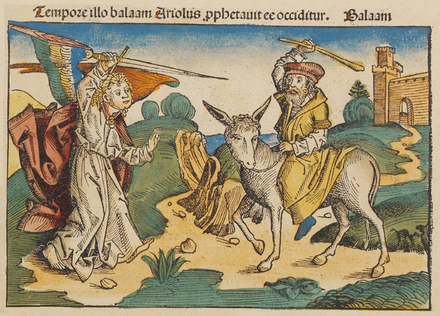
Balaam and the angel. Nuremberg Chronicle (1493)
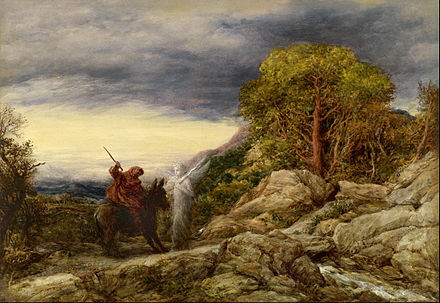
The Prophet Balaam and the Angel by John Linnell (1859)
Balaam sends back word that he can only do what YHWH commands, and God has, via a nocturnal dream, told him not to go. Balak consequently sends higher-ranking priests and offers Balaam honours; Balaam continues to press God, and God finally permits him to go but with instructions to say only what He commands. Balaam then sets out in the morning with the princes of Moab. God becomes angry that he went, implying that he only used Balaam as a tool to further his will, and sends the Angel of the Lord (Numbers 22:22) to prevent him. At first, the angel is seen only by the donkey Balaam is riding, which tries to avoid the angel. After Balaam starts punishing the donkey for refusing to move, it is miraculously given the power to speak to Balaam (Numbers 22:28), and it complains about Balaam's treatment. At this point, Balaam is allowed to see the angel, who informs him that the donkey's turning away from the messenger is the only reason the angel did not kill Balaam. Balaam immediately repents, but is told to go on.
Balak meets with Balaam at Kirjat Huzoth, and they go to the "high places of Baal", and offer sacrifices on seven altars, leading to Balaam being given a prophecy by Yahweh, which He speaks to Balak. However, the prophecy blesses Israel; Balak remonstrates, but Balaam reminds him that he can only speak the words put in his mouth, so Balak takes him to another "high place" at Pisgah, to try again. Building another seven altars here, and making sacrifices on each, Balaam provides another prophecy blessing Israel.
Balaam finally gets taken by a now very frustrated Balak to Peor, and, after the seven sacrifices there, decides not to "seek enchantments" but instead looks upon the Israelites from the peak. The Spirit of God comes upon Balaam and he delivers a third positive prophecy concerning Israel. Balak's anger rises to the point where he threatens Balaam, but Balaam merely offers a prediction of fate. Balaam then looks upon the Kenites, and Amalekites and offers two more predictions of their fates. Balak and Balaam then go to their respective homes.
Later, Numbers 25:1-9 describes how Israel engaged in the Heresy of Peor. Numbers 31:16 blames this on Balaam's advice and because of his culpability in the incident, which resulted in deadly divine judgments against the Israelites who participated, he was eventually killed in a retaliatory battle against Midian in Numbers 31:8.
Deuteronomy 23:3–6 summarizes these incidents, and further states that the Ammonites were associated with the Moabites. Joshua, in his farewell speech, also makes reference to it. With God's protection taken from him, Balaam is later listed among the Midianites who were killed in revenge for the "matter of Peor." Joshua 13:22 records that Balaam died "by the sword" during a battle for the Reubenite occupation of Moabite land.
by Ray Stedman
The Book of the Revelation also states that Balaam "taught Balak to cast a stumbling block before the children of Israel."
"To the angel of the church in Pergamum write:
"These are the words of him who has the sharp, double-edged sword. I know where you live -- where Satan has his throne. Yet you remain true to my name. You did not renounce your faith in me, even in the days of Antipas, my faithful witness, who was put to death in your city -- where Satan lives.
"Nevertheless, I have a few things against you: You have people there who hold to the teaching of Balaam, who taught Balak to entice the Israelites to sin by eating food sacrificed to idols and by committing sexual immorality. Likewise you also have those who hold to the teaching of the Nicolaitans. Repent therefore! Otherwise, I will soon come to you and will fight against them with the sword of my mouth." (Revelation 2:12-16 NIV)
This church is in sharp contrast to the church at Smyrna. Smyrna was enduring persecution; this church was faced with enticement and corruption. The devil has only two ways of approach. If he cannot make you knuckle under with hostility and persecution he will begin to entice you and lure you into something dangerous. It is either intimidation or enticement. It is either the violence of a roaring lion or the corruption of an angel of light. Pergamum is the church that is being undermined by corrupt practices and corrupt teaching.
Our Lord identifies himself to it as the one having "the sharp, doubled-edged sword." As we have already seen, that is the symbol of the Word of God coming from his lips. It is double-edged; it cuts two ways. I believe that refers to the fact that the Word can cleave the skull to get to the mind, and it can pierce the heart to touch the emotions. It can awaken us to reality. By the Word of God our minds begin to learn truth that we never saw before. We see things the way they are, and it motivates us to action. It can also pierce the heart. Remember that on the Day of Pentecost, when Peter had finished his message, the people were cut to the heart, according to the book of Acts. They cried, "Men and brethren, what must we do?" (Acts 2:37 KJV). That is the power of the Word. It touches both the reason and the conscience.
Pergamum was the Roman capital of the province of Asia. Located about 50 miles north of Smyrna. It was a center of pagan worship and there was a temple to Caesar there as well. It is called here, "where Satan has his throne," i.e. the place where Satan rules. And it is also referred to as the city "where Satan lives," i.e., where he has his headquarters. Many scholars think that refers to the great altar of Zeus which was on the hillside overlooking the city. It was a great chair, or throne, forty feet high, and any citizen could look up there at any time and see what Jesus calls "Satan's throne." This was such a center of pagan worship it seemed to be the very center of evil. There is a fascinating footnote of history in connection with this. In the 1880's, about 100 years ago, a German archaeologist working in the city of Pergamum removed that throne, that Satanic seat, from the hillside and took it to Europe. Today it is visible yet in the Pergamum Museum in the city -- get this -- of East Berlin! For 100 years Satan's throne has been in East Berlin. If that has any connection with the rise of Hitler, and the Nazis, I leave to you to judge. But East Berlin is also where Hitler's headquarters were located.
In his appraisal, our Lord assesses the strengths of this church: He says, first, "You remain true to my name." They had refused to budge on their view of his person. They held to the truth about Jesus. They saw him as the God-man, combining in one person two natures, both of God and man. That is orthodox doctrine. That is the teaching of the church from its very beginning, and clearly evident in the Scripture. Against all the corrupting influences around them, these people had held to that truth. Almost all heresies today flow out of a denial of the deity of Jesus. But we must not also deny the humanity of Jesus. He was God as though he had never been man, and man as though he was never God. Both are true. The church at Pergamum had held fast to that teaching. Second, they did this at the risk of their own lives. Jesus says, "You did not renounce your faith in me, even in the days of Antipas, my faithful witness, who was put to death in your city -- where Satan lives." Antipas means "against all." We do not know much about this man, although he is said to be the first martyr under the Roman persecution in Asia. Tradition says he was roasted to death in a brazen bull that was heated to a white heat. That is the price that he had to pay for being true to the doctrine about Jesus. He had to stand "against all!"
But two terrible errors were undermining this church: One is called here "the teaching of Balaam." You can read about it in Numbers 25. Balaam was a false prophet who had been hired by Balak, the King of Moab, to curse Israel, but when he tried to do so he found he could not. Every time he tried to curse them, words of blessing came out of his mouth. God would not let him curse his people. So, in order to achieve the end for which he had been hired, he paid beautiful maidens from Moab and Midian to parade before the young men of Israel, tempting them into sexual immorality. Since these women were worshipers of idols, by that means he introduced idol worship into the tribes of Israel. Thus he corrupted and enticed them into sin. The counterpart we face in our day is the practice of pornography and fornication among Christians and the acceptance of unmarriages, of living together without marriage, that is often widespread in the churches today. That is the error of Balaam.
They were also being seduced by the error of the Nicolaitans. Though it is difficult to know exactly who these people were, the name means "conquerors of the people." It appears they claimed to have a special relationship to God. They professed to be the beneficiaries of intimate revelations that were not given to others, and that they therefore had an inside track with God. They presumed to take the place of the priesthood in Judaism, and carried that error into the Christian church. Probably both of these false teachings worked together. One appealed to physical lust, and the other to the ambition for power exercised in a religious way. It is seen yet today in the supremacy of pastors who are lifted up above the laity. They are men who claim to have more intimate relationships with God, and thus are regarded as better than the rest of the people. The way you handle either error, of course, is with the sharp, two-edged sword! Jesus said, "Repent. Otherwise, I will come to you and fight against them with the sword of my mouth." The Word of God exposes both the error of immorality and the error of priestly superiority. That is one reason why the exposition of Scripture is resisted in many churches.
Prophetically, this is the period from the accession of Constantine in 320 A. D. to the rise of the papacy in the 6th century. During that period of time were held the great councils of the church. The council of Nicea, the council of Chalcedon and others, determined the true doctrine of the person of Christ -- who he was, and how he combined in himself the two natures. But it was also the time of the wedding of the church and the world under Constantine. (Incidentally, Pergamum means "marriage." It comes from the same root from which we get monogamy and bigamy). Constantine was not really a true Christian. He adopted many pagan practices and brought them into the church where they were accepted. Christianity was popular in those days, and many pagan practices were incorporated into it. This began when the church was viewed as a worldly kingdom, like any other kingdom. Our Lord's appeal is found in Verse 17:
"He who has an ear, let him hear what the Spirit says to the churches. To him who overcomes, I will give some of the hidden manna. I will also give him a white stone with a new name written on it, known only to him who receives it." (Revelation 2:17 NIV)
This is addressed to those who will take heed to the warnings of this letter, and watch in the areas of sexual immorality and of spiritual superiority. If you stand fast against immorality and the love of religious power you will be given the "hidden manna." Notice both the manna and the new name are secret things. It is a picture of close intimacy. Manna, of course, was the food that Moses fed the Israelites in the wilderness. Jesus said in Chapter 6 of John, "I am the bread sent down from heaven," (John 6:41). He is that hidden manna. He is food for the inner spirit, food that others do not know about. In John 4, our Lord sent his disciples into the city of Sychar to get food. When they came back and found he had been ministering to the woman at the well, he said, "I have had food that you know not of," (John 4:32). He was feeding upon the inner strength that God the Father was giving him. That is what is given to those who will resist the lure of immorality and spiritual privilege.
Then, with it, is the white stone with a secret name upon it. White stones were used among the Romans as a mark of special favor. A secret name, of course, is a sign of intimacy. Some years ago the well known Christian author, Elizabeth Elliott was speaking here at PBC. For a while I called her Betty Elliott because that was the name used in the book that she wrote about her husband Jim. One day she corrected me. She said, "You know, my name is not Betty, it is Elizabeth. Betty was Jim's private name for me." It was apparent to me that she wanted to preserve it as his name for her alone. So I began to call her Elizabeth instead of Betty. A secret name is a special mark of intimacy. If you know the Lord Jesus, and your heart is kept from the corrupting influences of the world around, you will enjoy an intimacy with him in which the new nature he has given you (depicted by the new name here), becomes stronger and more developed, and you enter into beautiful fellowship and intimacy with him.
--Ray Stedman, The Pressured Church.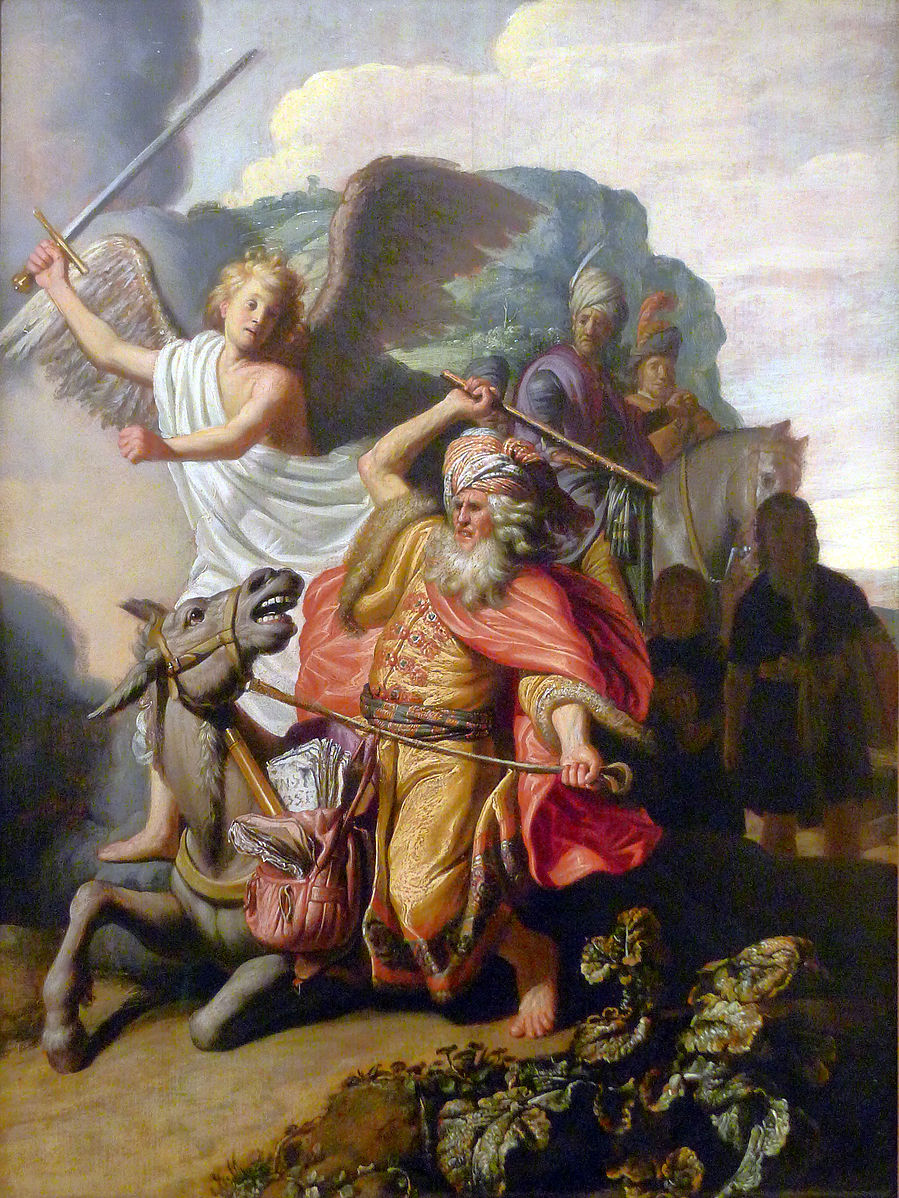
Balaam and the Ass, by Rembrandt van Rijn, 1626.
The text of Numbers 22-25 is appended below as many today do not own or a Bible or are unfamiliar with its contents.
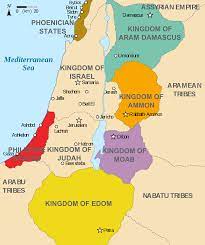 The Israelites set out, and camped in the plains of Moab across the Jordan from Jericho. Now Balak son of Zippor saw all that Israel had done to the Amorites. Moab was in great dread of the people, because they were so numerous; Moab was overcome with fear of the people of Israel. And Moab said to the elders of Midian, ‘This horde will now lick up all that is around us, as an ox licks up the grass of the field.’ Now Balak son of Zippor was king of Moab at that time. He sent messengers to Balaam son of Beor at Pethor, which is on the Euphrates, in the land of Amaw, to summon him, saying, ‘A people has come out of Egypt; they have spread over the face of the earth, and they have settled next to me. Come now, curse this people for me, since they are stronger than I; perhaps I shall be able to defeat them and drive them from the land; for I know that whomsoever you bless is blessed, and whomsoever you curse is cursed.’
The Israelites set out, and camped in the plains of Moab across the Jordan from Jericho. Now Balak son of Zippor saw all that Israel had done to the Amorites. Moab was in great dread of the people, because they were so numerous; Moab was overcome with fear of the people of Israel. And Moab said to the elders of Midian, ‘This horde will now lick up all that is around us, as an ox licks up the grass of the field.’ Now Balak son of Zippor was king of Moab at that time. He sent messengers to Balaam son of Beor at Pethor, which is on the Euphrates, in the land of Amaw, to summon him, saying, ‘A people has come out of Egypt; they have spread over the face of the earth, and they have settled next to me. Come now, curse this people for me, since they are stronger than I; perhaps I shall be able to defeat them and drive them from the land; for I know that whomsoever you bless is blessed, and whomsoever you curse is cursed.’
So the elders of Moab and the elders of Midian departed with the fees for divination in their hand; and they came to Balaam, and gave him Balak’s message. He said to them, ‘Stay here tonight, and I will bring back word to you, just as the Lord speaks to me’; so the officials of Moab stayed with Balaam. God came to Balaam and said, ‘Who are these men with you?’ Balaam said to God, ‘King Balak son of Zippor of Moab has sent me this message: “A people has come out of Egypt and has spread over the face of the earth; now come, curse them for me; perhaps I shall be able to fight against them and drive them out.” ’ God said to Balaam, ‘You shall not go with them; you shall not curse the people, for they are blessed.’ So Balaam rose in the morning, and said to the officials of Balak, ‘Go to your own land, for the Lord has refused to let me go with you.’ So the officials of Moab rose and went to Balak, and said, ‘Balaam refuses to come with us.’
Once again Balak sent officials, more numerous and more distinguished than these. They came to Balaam and said to him, ‘Thus says Balak son of Zippor: “Do not let anything hinder you from coming to me; for I will surely do you great honour, and whatever you say to me I will do; come, curse this people for me.” ’ But Balaam replied to the servants of Balak, ‘Although Balak were to give me his house full of silver and gold, I could not go beyond the command of the Lord my God, to do less or more. You remain here, as the others did, so that I may learn what more the Lord may say to me.’ That night God came to Balaam and said to him, ‘If the men have come to summon you, get up and go with them; but do only what I tell you to do.’ So Balaam got up in the morning, saddled his donkey, and went with the officials of Moab.
God’s anger was kindled because he was going, and the angel of the Lord took his stand in the road as his adversary. Now he was riding on the donkey, and his two servants were with him. The donkey saw the angel of the Lord standing in the road, with a drawn sword in his hand; so the donkey turned off the road, and went into the field; and Balaam struck the donkey, to turn it back on to the road. Then the angel of the Lord stood in a narrow path between the vineyards, with a wall on either side. When the donkey saw the angel of the Lord, it scraped against the wall, and scraped Balaam’s foot against the wall; so he struck it again. Then the angel of the Lord went ahead, and stood in a narrow place, where there was no way to turn either to the right or to the left. When the donkey saw the angel of the Lord, it lay down under Balaam; and Balaam’s anger was kindled, and he struck the donkey with his staff. Then the Lord opened the mouth of the donkey, and it said to Balaam, ‘What have I done to you, that you have struck me these three times?’ Balaam said to the donkey, ‘Because you have made a fool of me! I wish I had a sword in my hand! I would kill you right now!’ But the donkey said to Balaam, ‘Am I not your donkey, which you have ridden all your life to this day? Have I been in the habit of treating you in this way?’ And he said, ‘No.’
Then the Lord opened the eyes of Balaam, and he saw the angel of the Lord standing in the road, with his drawn sword in his hand; and he bowed down, falling on his face. The angel of the Lord said to him, ‘Why have you struck your donkey these three times? I have come out as an adversary, because your way is perverse before me. The donkey saw me, and turned away from me these three times. If it had not turned away from me, surely I would by now have killed you and let it live.’ Then Balaam said to the angel of the Lord, ‘I have sinned, for I did not know that you were standing in the road to oppose me. Now therefore, if it is displeasing to you, I will return home.’ The angel of the Lord said to Balaam, ‘Go with the men; but speak only what I tell you to speak.’ So Balaam went on with the officials of Balak.
When Balak heard that Balaam had come, he went out to meet him at Ir-moab, on the boundary formed by the Arnon, at the farthest point of the boundary. Balak said to Balaam, ‘Did I not send to summon you? Why did you not come to me? Am I not able to honour you?’ Balaam said to Balak, ‘I have come to you now, but do I have power to say just anything? The word God puts in my mouth, that is what I must say.’ Then Balaam went with Balak, and they came to Kiriath-huzoth. Balak sacrificed oxen and sheep, and sent them to Balaam and to the officials who were with him. (Numbers 22:1-41)
On the next day Balak took Balaam and brought him up to Bamoth-baal; and from there he could see part of the people of Israel.
Then Balaam said to Balak, ‘Build me seven altars here, and prepare seven bulls and seven rams for me.’ Balak did as Balaam had said; and Balak and Balaam offered a bull and a ram on each altar. Then Balaam said to Balak, ‘Stay here beside your burnt-offerings while I go aside. Perhaps the Lord will come to meet me. Whatever he shows me I will tell you.’ And he went to a bare height.
Then God met Balaam; and Balaam said to him, ‘I have arranged the seven altars, and have offered a bull and a ram on each altar.’ The Lord put a word in Balaam’s mouth, and said, ‘Return to Balak, and this is what you must say.’ So he returned to Balak, who was standing beside his burnt-offerings with all the officials of Moab. Then Balaam uttered his oracle, saying:
‘Balak has brought me from Aram,
the king of Moab from the eastern mountains:
“Come, curse Jacob for me;
Come, denounce Israel!”
How can I curse whom God has not cursed?
How can I denounce those whom the Lord has not denounced?
For from the top of the crags I see him,
from the hills I behold him;
Here is a people living alone,
and not reckoning itself among the nations!
Who can count the dust of Jacob,
or number the dust-cloud of Israel?
Let me die the death of the upright,
and let my end be like his!’
Then Balak said to Balaam, ‘What have you done to me? I brought you to curse my enemies, but now you have done nothing but bless them.’ He answered, ‘Must I not take care to say what the Lord puts into my mouth?’
So Balak said to him, ‘Come with me to another place from which you may see them; you shall see only part of them, and shall not see them all; then curse them for me from there.’ So he took him to the field of Zophim, to the top of Pisgah. He built seven altars, and offered a bull and a ram on each altar. Balaam said to Balak, ‘Stand here beside your burnt-offerings, while I meet the Lord over there.’ The Lord met Balaam, put a word into his mouth, and said, ‘Return to Balak, and this is what you shall say.’ When he came to him, he was standing beside his burnt-offerings with the officials of Moab. Balak said to him, ‘What has the Lord said?’Then Balaam uttered his oracle, saying:
‘Rise, Balak, and hear;Then Balak said to Balaam, ‘Do not curse them at all, and do not bless them at all.’ But Balaam answered Balak, ‘Did I not tell you, “Whatever the Lord says, that is what I must do”?’
listen to me, O son of Zippor:
God is not a human being, that he should lie,
or a mortal, that he should change his mind.
Has he promised, and will he not do it?
Has he spoken, and will he not fulfil it?
See, I received a command to bless;
he has blessed, and I cannot revoke it.
He has not beheld misfortune in Jacob;
nor has he seen trouble in Israel.
The Lord their God is with them,
acclaimed as a king among them.
God, who brings them out of Egypt,
is like the horns of a wild ox for them.
Surely there is no enchantment against Jacob,
no divination against Israel;
now it shall be said of Jacob and Israel,
“See what God has done!”
Look, a people rising up like a lioness,
and rousing itself like a lion!
It does not lie down until it has eaten the prey
and drunk the blood of the slain.’
So Balak said to Balaam, ‘Come now, I will take you to another place; perhaps it will please God that you may curse them for me from there.’So Balak took Balaam to the top of Peor, which overlooks the waste-land. Balaam said to Balak, ‘Build me seven altars here, and prepare seven bulls and seven rams for me.’ So Balak did as Balaam had said, and offered a bull and a ram on each altar. (Numbers 23:1-30)
Now Balaam saw that it pleased the Lord to bless Israel, so he did not go, as at other times, to look for omens, but set his face towards the wilderness. Balaam looked up and saw Israel camping tribe by tribe. Then the spirit of God came upon him, and he uttered his oracle, saying:
‘The oracle of Balaam son of Beor,
the oracle of the man whose eye is clear,
the oracle of one who hears the words of God,
who sees the vision of the Almighty,
who falls down, but with eyes uncovered:
how fair are your tents, O Jacob,
your encampments, O Israel!
Like palm groves that stretch far away,
like gardens beside a river,
like aloes that the Lord has planted,
like cedar trees beside the waters.
Water shall flow from his buckets,
and his seed shall have abundant water,
his king shall be higher than Agag,
and his kingdom shall be exalted.
God, who brings him out of Egypt,
is like the horns of a wild ox for him;
he shall devour the nations that are his foes
and break their bones.
He shall strike with his arrows.
He crouched, he lay down like a lion,
and like a lioness; who will rouse him up?
Blessed is everyone who blesses you,
and cursed is everyone who curses you.’
Then Balak’s anger was kindled against Balaam, and he struck his hands together. Balak said to Balaam, ‘I summoned you to curse my enemies, but instead you have blessed them these three times. Now be off with you! Go home! I said, “I will reward you richly”, but the Lord has denied you any reward.’ And Balaam said to Balak, ‘Did I not tell your messengers whom you sent to me, “If Balak should give me his house full of silver and gold, I would not be able to go beyond the word of the Lord, to do either good or bad of my own will; what the Lord says, that is what I will say”? So now, I am going to my people; let me advise you what this people will do to your people in days to come.’
So he uttered his oracle, saying:
‘The oracle of Balaam son of Beor,
the oracle of the man whose eye is clear,
the oracle of one who hears the words of God,
and knows the knowledge of the Most High,
who sees the vision of the Almighty,
who falls down, but with his eyes uncovered:
I see him, but not now;
I behold him, but not near—
a star shall come out of Jacob,
and a scepter shall rise out of Israel;
it shall crush the borderlands of Moab,
and the territory of all the Shethites.
Edom will become a possession,
Seir a possession of its enemies,
while Israel does valiantly.
One out of Jacob shall rule,
and destroy the survivors of Ir.’Then he looked on Amalek, and uttered his oracle, saying:
‘First among the nations was Amalek,
but its end is to perish for ever.’Then he looked on the Kenite, and uttered his oracle, saying:
‘Enduring is your dwelling-place,
and your nest is set in the rock;
yet Kain is destined for burning.
How long shall Asshur take you away captive?’Again he uttered his oracle, saying:
‘Alas, who shall live when God does this?
But ships shall come from Kittim
and shall afflict Asshur and Eber;
and he also shall perish for ever.’
Then Balaam got up and went back to his place, and Balak also went his way. (Numbers 24:1-25)
While Israel was staying at Shittim, the people began to have sexual relations with the women of Moab. These invited the people to the sacrifices of their gods, and the people ate and bowed down to their gods. Thus Israel yoked itself to the Baal of Peor, and the Lord’s anger was kindled against Israel. The Lord said to Moses, ‘Take all the chiefs of the people, and impale them in the sun before the Lord, in order that the fierce anger of the Lord may turn away from Israel.’ And Moses said to the judges of Israel, ‘Each of you shall kill any of your people who have yoked themselves to the Baal of Peor.’
Just then one of the Israelites came and brought a Midianite woman into his family, in the sight of Moses and in the sight of the whole congregation of the Israelites, while they were weeping at the entrance of the tent of meeting. When Phinehas son of Eleazar, son of Aaron the priest, saw it, he got up and left the congregation. Taking a spear in his hand, he went after the Israelite man into the tent, and pierced the two of them, the Israelite and the woman, through the belly. So the plague was stopped among the people of Israel. Nevertheless, those that died by the plague were twenty-four thousand.
The Lord spoke to Moses, saying: ‘Phinehas son of Eleazar, son of Aaron the priest, has turned back my wrath from the Israelites by manifesting such zeal among them on my behalf that in my jealousy I did not consume the Israelites. Therefore say, “I hereby grant him my covenant of peace. It shall be for him and for his descendants after him a covenant of perpetual priesthood, because he was zealous for his God, and made atonement for the Israelites.” ’
The name of the slain Israelite man, who was killed with the Midianite woman, was Zimri son of Salu, head of an ancestral house belonging to the Simeonites. The name of the Midianite woman who was killed was Cozbi daughter of Zur, who was the head of a clan, an ancestral house in Midian.
The Lord said to Moses, ‘Harass the Midianites, and defeat them; for they have harassed you by the trickery with which they deceived you in the affair of Peor, and in the affair of Cozbi, the daughter of a leader of Midian, their sister; she was killed on the day of the plague that resulted from Peor.’ (Numbers 25:1-17)
![]()
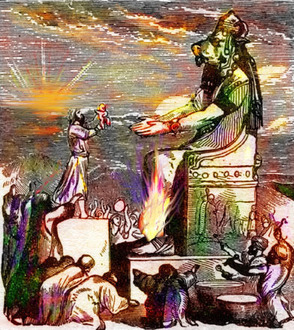
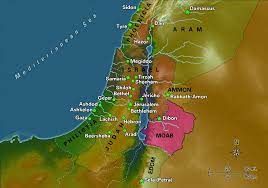 The map on the left shows that the territory of Moab, now part of Jordan, lies just South and East of Jericho where the Jews will soon enter the promised land at last, as described the Book of Joshua. First comes the Second Giving of the Law, Deuteronomy, and the death of Moses. Moab is located where Sodom and Gomorrah were located. These Canaanite cities were destroyed in the time of Abraham, about 500 years earlier. See The Meaning of Sodom and Gomorrah.
The map on the left shows that the territory of Moab, now part of Jordan, lies just South and East of Jericho where the Jews will soon enter the promised land at last, as described the Book of Joshua. First comes the Second Giving of the Law, Deuteronomy, and the death of Moses. Moab is located where Sodom and Gomorrah were located. These Canaanite cities were destroyed in the time of Abraham, about 500 years earlier. See The Meaning of Sodom and Gomorrah.
America has three main gods now, they are fallen angels, Canaanite deities. They are Baal, Ashteroth and Moloch. The worship of sex underlies all three.
Scientific Naturalism is our unofficial national religion these days! In philosophy, naturalism is the idea or belief that only natural laws and forces (as opposed to supernatural or spiritual ones) operate in the universe. Adherents of naturalism assert that natural laws are the only rules that govern the structure and behavior of the natural world, and that the changing universe is at every stage a product of these laws.
Naturalism is not so much a special system as a point of view or tendency common to a number of philosophical and religious systems; not so much a well-defined set of positive and negative doctrines as an attitude or spirit pervading and influencing many doctrines. As the name implies, this tendency consists essentially in looking upon nature as the one original and fundamental source of all that exists, and in attempting to explain everything in terms of nature. Either the limits of nature are also the limits of existing reality, or at least the first cause, if its existence is found necessary, has nothing to do with the working of natural agencies. All events, therefore, find their adequate explanation within nature itself. But, as the terms nature and natural are themselves used in more than one sense, the term naturalism is also far from having one fixed meaning. With the exception of pantheists--who believe that Nature is identical with divinity while not recognizing a distinct personal anthropomorphic god--theists challenge the idea that nature contains all of reality. According to some theists, natural laws may be viewed as secondary causes of God. (Wikipedia)
That the Hebrew God is the best known of all gods worshiped in the world today needs no explanation. The Jews, the Christians and the Muslims, among others, all accord the ancient Hebrew God their devotion. Whatever else those three faiths might say, they would agree with Psalm 95:3, that “The Lord is a great God and a great king above all gods.”
But God is not and has not been without his rivals, even in antiquity. Even in the pages of the Hebrew Bible, there were many alternatives to the Lord God of Israel, and in this article we will consider three of the now largely forgotten deities who once opposed Him, who alone is most great.
Perhaps the best known ancient rival to the Hebrew God was the pagan Baal, a term which means “master” or Lord”, and is probably originally a general term for a variety of local deities in the area in and near the holy land. An example of a local Baal cult is called “Baal-peor” mentioned in Numbers 25:3, where the Israelites disgraced themselves in some sexual rites with the Moabites and worshiped the local god, incurring the wrath and punishment of their own God.
Over the centuries, however, the cults of the “Baalim” became merged and several specific larger cults developed. The best known of these was the cult of the Syrian god Melqart, worshiped by King Ahab of Israel and his “wicked” wife Jezebel. It was this Israelite worship of Baal which was challenged by the Hebrew prophet Elijah in his famous conflict with the prophets of Baal on Mount Carmel in I Kings 18, when he challenged the false prophets to bring down fire from heaven. When the prophets of Baal failed to do so, Elijah’s God did so, resulting in the slaughter of the prophets of Baal by an angry mob. But the worship of the god was not so easily extinguished.
The god or gods called Baal normally required the sacrifice of children, often the first-born male child, by sacrifice by fire. It has been suggested that the famous story of Abraham’s sacrifice of his son Isaac, when God told Abraham to sacrifice his son and then forbade the sacrifice at the last moment, was told to the ancients as a dramatic and instructive narrative which commanded the Hebrews not to follow the pagan cults of the land. It was as if to say that even the great patriarch himself did not sacrifice his son, but it was only a test of his faith, and so too good Hebrews must not follow the practice of the people of the land however tempted they were.
In post-biblical archeology, we note that the cult of Baal was taken by the Phoenicians to North Africa, where he was worshiped by the Carthaginian peoples. We are not surprised to find his name incorporated into the name of the great Carthaginian general Hannibal who harried Fabius Maximus and the generals of Rome with his wonderful elephants. In any event, Baal’s cult came to an abrupt end with the Roman sack of Carthage in 146 B.C.
 Another popular goddess worshiped in the days of the Bible was Ashtaroth, a deity associated with sexuality and fertility, and by some peoples war. He was probably tied to the Mesopotamian cult of Ishtar, which in turn was probably derived from the very ancient Sumerian mother goddess Inanna. The Hebrew Bible also calls this same goddess Astarte. The ancient Hebrew prophets denounced her cult many times, most likely because she was worshiped with sexual fertility rites. Certainly her cult predated the Hebrews by many centuries, and when the Philistines slaughtered Saul, the first king of Israel, they could think of no better tribute than to place his battle armor in her temple as a tribute. (I Samuel 31:10) Many nude statues of her have been uncovered by archaeologists and the Bible refers to her fertility poles, or rods, on many occasions. Her cult must have been very popular, as it even swayed, or corrupted, the heart of wise King Solomon, for which he was criticized in I Kings 11:5.
Another popular goddess worshiped in the days of the Bible was Ashtaroth, a deity associated with sexuality and fertility, and by some peoples war. He was probably tied to the Mesopotamian cult of Ishtar, which in turn was probably derived from the very ancient Sumerian mother goddess Inanna. The Hebrew Bible also calls this same goddess Astarte. The ancient Hebrew prophets denounced her cult many times, most likely because she was worshiped with sexual fertility rites. Certainly her cult predated the Hebrews by many centuries, and when the Philistines slaughtered Saul, the first king of Israel, they could think of no better tribute than to place his battle armor in her temple as a tribute. (I Samuel 31:10) Many nude statues of her have been uncovered by archaeologists and the Bible refers to her fertility poles, or rods, on many occasions. Her cult must have been very popular, as it even swayed, or corrupted, the heart of wise King Solomon, for which he was criticized in I Kings 11:5.
Poor King Solomon also was led astray by the third of the favorite pagan gods of the land, Molech, to whom he raised an altar near Jerusalem, although the Bible tells us that God twice warned him not to and in punishment for this his heir would be deprived of 10 of the tribes of his great kingdom. (I Kings 11:10). Molech was a god of the Ammonite peoples. His name seems to be tied to the Hebrew word “melek” which means “king,” which in turn suggests he was an older god, perhaps the Akkadian deity Mulik. Like Baal, his cult may have also been transported to Carthage, where he was worshiped as the god Molech until the servants of the Olympian gods pulverized ancient Carthage.
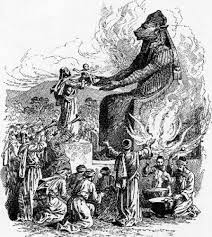 The Hebrew Bible was quite fierce in its denunciations of Molech, not simply because of the sin of idolatry but also because of the custom of the worshipers of Molech of sacrificing children to the god by fire. The Hebrew prophet Jeremiah describes with horror the ancient rites, telling us that God says, “They built high places to Baal in the Valley of Beth-hinnom and immolated their sons and daughters to Molech bringing sin upon Judah; this I never commanded them, nor did it enter my mind that they should practice such abominations. (Jeremiah 32:35)
The Hebrew Bible was quite fierce in its denunciations of Molech, not simply because of the sin of idolatry but also because of the custom of the worshipers of Molech of sacrificing children to the god by fire. The Hebrew prophet Jeremiah describes with horror the ancient rites, telling us that God says, “They built high places to Baal in the Valley of Beth-hinnom and immolated their sons and daughters to Molech bringing sin upon Judah; this I never commanded them, nor did it enter my mind that they should practice such abominations. (Jeremiah 32:35)
The Hebrew God reacted very strongly to this kind of worship. The Torah on several occasions commands the death penalty for anyone worshiping him. The text tells us that “Tell the Israelites, anyone, whether an Israelite or an alien residing in Israel, who gives any of his offspring to Molech shall be put to death. Let his fellow citizens stone him. I (God) myself will turn against such a man and cut him off from the body of his people; for in giving his offspring to Molech, he has defiled my sanctuary and profaned my holy name.” (Leviticus 20:2-3)
It must have been a terrifying and tempting thing to the peoples of antiquity when they saw the impressive temples of the pagan gods, the loud music, the professional priesthoods and their claims that such blood sacrifices and exotic fertility rites could make people’s lives better. The Hebrew God by comparison spent a lot of his career with a solitary ark drawn around in a cart. Later, He had but few holy places for sacrifice and in the days of Solomon these were concentrated into only one temple in Jerusalem. But the humble worship of the Hebrew God, who had no images, ritual tattoos and who rejected child sacrifice, survived. The images of Baal, Ashteroth and Molech are today viewed primarily by bored school children in museums.
For an unmarried man or woman to have casual sex after a party is very common today. What then about two men or two women having kinky sex or single men men masturbating regularly all their lives (with or without porn)? This seems to be the way many live these days, especially the younger gens.
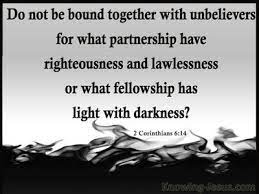 A related issue was in the Law of Moses: Jewish men were not to take non-Jewish wives. The book of Nehemiah closes with a summary of some drastic reforms undertaken by this venerable, godly man, after the walls of Jerusalem had been rebuilt in 445 BC.
A related issue was in the Law of Moses: Jewish men were not to take non-Jewish wives. The book of Nehemiah closes with a summary of some drastic reforms undertaken by this venerable, godly man, after the walls of Jerusalem had been rebuilt in 445 BC.
This article is not written for the innocent, for underage children, for single men and women, for the divorced, widows, orphans, the homeless who know and are walking with Jesus. Most precious of all, though rare, are marriages and families functioning in ways pleasing to our God in these evil times where pressures are very high. May God affirm, protect, and safely deliver home all who trust Jesus--everyone young or old who is leaning on the everlasting arms.In those days also I saw Jews who had married women of Ashdod, Ammon, and Moab; and half of their children spoke the language of Ashdod, and they could not speak the language of Judah, but spoke the language of various peoples. And I contended with them and cursed them and beat some of them and pulled out their hair; and I made them take an oath in the name of God, saying, ‘You shall not give your daughters to their sons, or take their daughters for your sons or for yourselves. Did not King Solomon of Israel sin on account of such women? Among the many nations there was no king like him, and he was beloved by his God, and God made him king over all Israel; nevertheless, foreign women made even him to sin. Shall we then listen to you and do all this great evil and act treacherously against our God by marrying foreign women?’
And of Jehoiada, son of the high priest Eliashib, was the son-in-law of Sanballat the Horonite; I chased him away from me. Remember them, O my God, because they have defiled the priesthood, the covenant of the priests and the Levites." (Nehemiah 13:23-31)
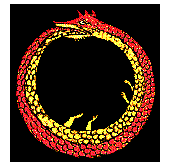
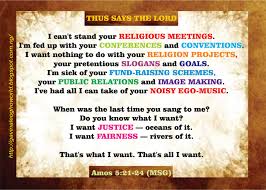
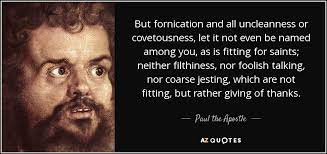
The Management of the Universe
There's a War On, Folks!
The Strongholds of Inner Space
A New Creation
Resources on Prayer
Intercessors
![]()
Lambert Dolphin's Main Library
Email Lambert Dolphin
Archive for Newsletters
Library Annex (800+ free articles since 2018)

August 29, 2021, September 24, 2022. March 28, 20 June 3, 2023. October 27, 2023.